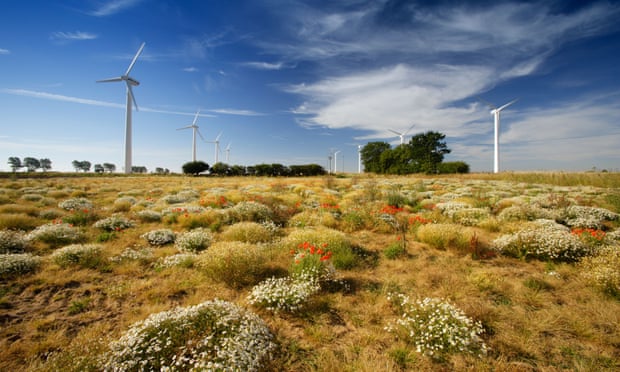Surveys consistently show that British people like renewable energy and community projects even more. Photograph: Richard Osbourne/Blue Pearl Photographic/Alamy
obin Hood: one of Britain’s best-loved folk heroes. He speaks to our national love of subverting the rules. Fighting against institutional injustice, he protected the most vulnerable from the predatory practices of a corrupt establishment.
Nottingham city council’s new not-for-profit energy supply company, Robin Hood Energy, is not only the first of its kind, but the perfect contemporary manifestation of this spirit of righteous derring-do.Aware that the most vulnerable households – those on prepayment meters – were getting the worst deal from our current set up of the big six energy suppliers, and frustrated with the agonisingly slow progress from the government, Nottingham city council decided to take matters into its own hands and become a fully licensed energy supplier.
This bold plan had three aims: tackle local fuel poverty, return profits to customers via reduced tariffs and support community energy projects to get local renewable generation off the ground.
As Nottingham’s project lead Gail Scholes told me in May, navigating the onerous and painful regulation minefield this entailed was not for the faint-hearted. The UK’s energy market rules are sclerotic and abstruse, designed and written by their incumbent beneficiaries, the big six, in a way that seems calculated to freeze out new competitors.But Nottingham bravely battled through and a little over two years later has, rather serendipitously, finally launched Robin Hood Energy at the start of Britain’s annual Community Energy Fortnight.
Nottingham’s project is just a part of a fast-growing national movement to take back power – both literally and figuratively – for the people. From Cornwall to the Highlands, the past five years have seen local community renewable energy schemes mushrooming. Many of them are opening their doors over Community Energy Fortnight, when the public will be able to see community solar in action at Palmers Green Mosque in London, community hydro at Osney Lock in Oxfordshire and community wind at Marshill Farm in Lanarkshire, Scotland.
Surveys of public attitudes to different energy sources consistently show that British people like renewable energy a lot and want to see more of it. But throw community ownership into the mix and like turns to love – a recent Co-Op Energy poll showed that even Conservative voters would overwhelmingly support a local wind farm if it was owned and controlled by the community. Nearly four-fifths of those surveyed want the government to do more to help communities generate their own power and keep the profits.
Unfortunately, the government seems to have little interest in what the public wants from the UK’s energy system, pushing ahead with fracking in the teeth of intense and growing public hostility while launching a savage surprise attack on the nation’s favourite source of renewable energy, solar power.
The story of Balcombe in West Sussex perhaps best embodies the mismatch between public preferences and current energy policy. Two years after Cuadrilla packed up and left following huge protests against its plans to frack there, the residents of Balcombe are on the cusp of realising their mission to generate enough locally owned solar energy to meet the electricity needs of every home in the village.
Later this month, if all goes according to plan, the people of Balcombe will gain planning permission for a 5MW solar farm and begin a scramble to raise the £5m necessary to get the facility built before next April – when solar farm support will come to an abrupt end.
If the government goes through with its plans, there will be no new community solar farms after Balcombe’s, no more community wind or hydro schemes and one million fewer solar roofs installed nationwide over the next five years. There will be an awful lot of fracking going on though.
Source by:http://www.theguardian.com/public-leaders-network/2015/sep/10/renewable-energy-politicians-community-fracking

No comments:
Post a Comment